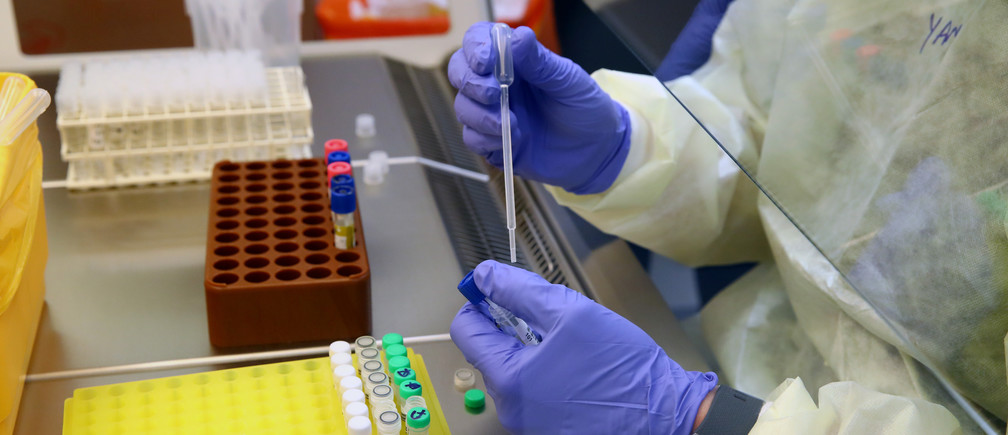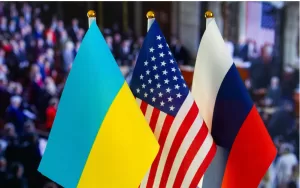Prabir Purkayastha and Raul Diego
US Declares Vaccine War on the World
Prabir Purkayastha, 24 May 2020
US President Donald Trump launched a new vaccine war this week, but not against the virus. It was against the world. The US and UK were the only two hold-outs in the World Health Assembly on the declaration that vaccines and medicines for COVID-19 should be available as public good, and not under exclusive patent rights. The US explicitly disassociated from the patent pool call, talking instead of “the critical role that intellectual property” plays – in other words, patents for vaccines and medicines. Having badly botched his COVID-19 response, Trump is trying to redeem his electoral fortunes in the November elections this year by promising an early vaccine. His ‘Make America Great Again’ is vaccines for “us”, but the rest will have to queue up and pay what big pharma asks, as they will hold the patents.
In contrast, all other countries agreed that with the Costa Rican proposal in the World Health Assembly that there should be a patent pool for all COVID-19 vaccines and medicines. President Xi Jinping said that Chinese vaccines would be available as public good, a view also shared by leaders from the European Union. Among the eight vaccine candidates in Phase1 and 2 of clinical trials, the Chinese have four, the US two, and UK and Germany have one each.
Trump has a given an ultimatum to the World Health Organization (WHO) regarding a permanent withdrawal of funds, if it does not mend its ways in 30 days. In sharp contrast, in the Assembly, almost all countries including close allies of the US, rallied behind the WHO. The failure of the Centers for Disease Control and Prevention (CDC) against COVID-19, with four times the annual budget of the WHO, is visible to the world. The CDC failed to provide a successful test for the SARS-CoV-2 even after two months of the WHO distributing successful test kits to more than 120 countries. Trump has yet to hold his administration and the CDC responsible for this criminal bungling. This, more than any other failure, is the reason that the US numbers for COVID-19 cases are now more than 1.5 million, and about a third of all global infections. Contrast this with China, the first to face an unknown epidemic – which stopped it at 82,000 cases – and what countries such as Vietnam and South Korea have done.
There is one issue looming large over the COVID-19 pandemic now. If we do not address the intellectual property rights issue in this pandemic, we are likely to see a repeat of the AIDS tragedy. People died for ten years as patented AIDS medicine was priced at between 10,000 to 15,000 dollars for a year’s supply, far beyond their reach. Finally, it was Indian patent laws that, till 2004, did not allow for such patents, helping people to get AIDS medicine at less than a dollar a day, or $350 for a year’s supply. Today, 80% of the AIDS medicines in the world comes from India. For big pharma, profits trumped lives, and they will continue to do so, Covid or no Covid, unless we change the world.
Most countries have compulsory licensing provisions that will allow them to break patents in case of epidemics or health emergencies. Even the World Trade Organization (WTO), after a bitter fight, accepted in its Doha Declaration (2001), that countries in a health emergency have the right to allow any company to manufacture a patented drug, and even import it from other countries.
Why is it then, that countries are unable to break patents, even if there are provisions in their laws and in the TRIPS Agreement? It is US bullying and the fear of the country. Under US domestic Trade Act, it issues Special Reports—USTR 301—threatening any country with trade sanctions that tries to compulsorily license any product. India figures prominently each year, for daring to issue a compulsory license in 2012 to Natco Pharma for Nexavar, a cancer drug, which Bayer AG was selling for $65,000 a year. Marijn Dekkers, the CEO of Bayer, was widely quoted saying that this was “theft”, and “We did not develop this medicine for Indians…We developed it for western patients who can afford it.”
This leaves unanswered how many people, even in the west, can afford a $65,000 bill for an illness. But there is no question that this would be a death sentence for anybody but the super rich in countries like India. Though a number of other drugs were under also consideration for compulsory licensing at the time, India has not exercised this provision again after US threats.
It is the fear that countries can break patents using their compulsory licensing provisions that led to proposals for patent pooling. The argument was that since many of these diseases do not affect rich countries, big pharma should either let go of their patents to such patent pools, or philanthropic capital should provide the additional funds for developing new drugs for adding to this pool. It is this idea of patent pooling that was backed by all countries in the recent World Health Assembly, WHA-73, barring the US and its loyal camp follower, the UK. The US also entered its disagreement with the final WHA resolution on this issue.
While patent pooling is welcome if no other measure is available, it also makes it appear as if countries have no other recourse aside from charity by big capital. What this hides, as charity always does, is that people and countries have legitimate rights, even under TRIPS, to break patents.
The US, which screams murder if compulsory license is issued by any country, has no such compunction when its own interests are threatened. During the anthrax scare in 2001, the US Secretary of Health issued a threat to Bayer under “eminent domain for patents”, for licensing ciprofloxacin to other manufacturers. Bayer folded, and agreed to supply the quantity and at a price that the US government demanded for. And, without a whimper. Yes, the same Bayer, which considers India a “thief” for issuing a compulsory license!
The vaccines for COVID-19 might need to be repeated each year, as we still do not know the duration of its protection. It is unlikely that it will provide lifetime immunity like the Smallpox vaccine. Unlike AIDS, where patient numbers were smaller, and could be stigmatized in different ways, COVID-19 is a visible threat for everyone. Any attempt to hold people and governments to ransom on COVID-19 vaccines or medicines, could see the collapse of the entire patent edifice of TRIPS that big pharma, backed by the US and major EU countries, have built. It is why the more clever of the capitalist world have moved towards a patent pool for COVID-19 medicines and vaccine.
Unlike clever capital, Trump’s response to the COVID-19 vaccine is to simply bully his way through. He believes that with unlimited money that he is now willing to put into the vaccine efforts, the US would either beat everybody else to the winning post, or buy the company that is successful. If he succeeds, he can then use ‘his’ COVID-19 vaccine as a new instrument of global power. It is the US that will then decide which countries get the vaccine, and which ones do not.
Trump does not believe in a rule-based global order, even if the rules are biased in the favor of the rich. He is walking out of various arms control agreements and has crippled the WTO. He believes that the US, as the biggest economy and the most powerful military power, should have the untrammeled right to dictate to all countries. Threats of bombing and invasions can be combined with unilateral sanctions; and the latest in his imaginary arsenal, is withholding vaccines.
His problem is that the days of a sole global hegemon are long over. The US has shown itself as a crumbling giant and its epidemic response has been shambolic. It has been unable to provide virus tests to its people in time, and failed to stop the epidemic through containment or mitigation measures, which a number of other countries have done.
China and the EU have already agreed that any vaccine developed by them will be regarded as public good. Even without that, once a medicine or a vaccine is known to be successful, any country with a reasonable scientific infrastructure can replicate the medicine or the vaccine, and manufacture it locally. India, as many other countries, has the scientific capability. We also have one the largest generic drug and vaccine manufacturing capacities in the world. What prevents us, or any country for that matters, from manufacturing vaccines or the drugs once they are developed? Only the empty threat of a failed hegemon on breaking patents? Or the belief that in the US-China vaccine war, they need to be on the US side?
(Prabir Purkayastha is the founding editor of Newsclick.in, a digital media platform. He is an activist for science and the Free Software movement.)
◆◆◆
Trump Unveils Plan that Would See Big Pharma Reap Massive Profits from COVID-19 Vaccine
Raul Diego, 15 May 2020
A former Big Pharma executive and a four-star General have just been appointed by President Trump to lead a “Manhattan project-style effort to develop a vaccine for the novel coronavirus.” The effort, called Operation Warp Speed, has set a goal to create 300 million doses of a non-existent vaccine by January.
Moncef Slaoui, who used to run research and development for the world’s largest vaccine company, GlaxoSmithKline (GSK), oversaw the development of an Ebola vaccine in tandem with the American National Institutes of Health (NIH) and a biotech firm the company had acquired two years earlier, that was distributed in the West African nation of Liberia in 2015. Slaoui joined the board of directors of the Human Vaccines Project in 2018; a public-private partnership that intends to “accelerate the development of vaccines and immunotherapies against major global diseases” and counts with the participation of the biggest pharmaceutical companies in the world, including Sanofi Pasteur, Johnson & Johnson, Pfizer and, of course, GSK.
Joining him will be U.S. Army General Gustave F. Perna, commanding general of the U.S. Army Materiel Command (AMC)–the primary provider of materiel to the United States Army–since 2016. As such, Perna has been in charge of logistical management for the Department of Defense’s (DoD) co-production agreements of American weapons systems with foreign countries, in addition to the approximately 149 locations worldwide and over 70,000 military and civilian employees who carry out the command’s motto:
“If a Soldier shoots it, drives it, flies it, wears it, communicates with it, or eats it–AMC provides it.”
The announcement comes two days after a press release by the Department of Defense revealed that a $138 million contract was awarded to ApiJect Systems America for the production of millions of prefilled syringes as part of projects “Jumpstart” and “RAPID” (Rapid Aseptic Packaging of Injectable Drugs). The DoD claims that the contract will “dramatically expand U.S. production capability” of injectable vaccines by October of this year. Project Jumpstart, according to the press release, was coordinated with their Joint Acquisition Task Force and HHS’s Office of the Assistant Secretary for Preparedness and Response (ASPR), led by Dr. Robert Kadlec, who has recently been the subject of intense scrutiny over some highly questionable ties to Big Pharma and curious past.
A tug of war for the SNS
The Trump administration’s ostensibly independent program to develop and deploy a vaccine against COVID-19 had been in the hands of his son-in-law, Jared Kushner and Trump advisor, Peter Navarro, though Bloomberg reported in April that HHS Secretary Alex Azar had been tasked by Trump to speed up the development of a vaccine and had been meeting for at least a month prior with White House officials.
The rollout is occurring as Congressional attention focuses on irregularities surrounding the supply of ventilators in the Strategic National Stockpile (SNS), a thousand of which were shipped to South Africa just the other day. In addition, yesterday’s so-called “whistleblower” testimony by ousted Biomedical Advanced Research and Development Authority (BARDA) chief, Rick Bright, is also spotlighting the issues at the SNS, which is controlled by HHS’ ASPR, Robert Kadlec. BARDA is an office within ASPR that is tasked with sourcing pharmaceutical and medical supplies for the Strategic National Stockpile.
More controversy surrounding the Strategic National Stockpile erupted after Kushner made remarks about the role the SNS plays in emergency deployment situations. Kushner was harshly criticized for implying that the SNS belonged to the federal government and served only as a back-up for states, who should be accumulating their own stockpiles. Despite being contradicted by well-established guidelines, which make clear that the SNS is in place to shore up any deficiencies in a public health emergency, the White House deliberately changed the language on its website to back up Kushner’s erroneous assertions about the stockpile.
What seems clear, however, is that Kushner himself was not the mastermind behind the sudden policy tweak. Speaking on the condition of anonymity, a spokesperson for the Office of the ASPR told CNN they had been using such language “for weeks now.” Considering the history of how the SNS came to be in the hands of the ASPR, this latest tweak to how the SNS is managed might just be a new wrinkle in an old plan to mass inoculate the population of the United States.
Mass involuntary vaccines and jostling for profits
Yesterday, President Donald Trump revealed that a decision had been made to mobilize the U.S. military to deliver mass vaccinations across the country. The “massive job,” however, still has no discernable vaccine yet to inject into the American population “at the end of the year.” Trump’s group of medical advisors, including NIAID director, Anthony Fauci, are skeptical that any such vaccine can be developed sooner than 12 to 18 months.
“Duplication only leads to infighting and slowing people down,” said former U.S. ASPR, Nicole Lurie regarding the creation of Operation Warp Speed. She decried the spirit of marketplace competition, stating that the world “should be engaged in this competition against the virus, not against one another.”
With over 110 COVID-19 vaccines in development–only eight of which have entered human trials–the race to be the vaccine chosen for deployment by the ASPR in the forthcoming potentially compulsory vaccination of more than 300 million people has many people seeing green.
(Raul Diego is a MintPress News Staff Writer, independent photojournalist, researcher, writer and documentary filmmaker.)




